Boko Haram in Buhari’s speeches in 2015 and 2019 [Data and content analysis]

Presidential inaugural speeches give heads of states with a periodic opportunity to renew their social contract with their people. Carefully crafted and pored upon for, perhaps, weeks before their delivery, such political rhetoric are expected to leave sweet tastes in the mouth of their audience. Quotable quotes, take-away promises, renewal of hope, paradigm shifts and critical data that support government’s renewed zeal are the usual components of such epoch-making speeches. Some of these were not well-pronounced in President Muhammadu Buhari’s speech in 2019.
A quick comparison of the 2015 speech with that of 2019 throws up useful data. The Democracy Day speech is about one thousand words longer than Buhari’s 2015 address to the nation at his inauguration on May 29, 2015. In the 2015 speech, the word count was 1,910, while in 2019, the word count was a whopping 3,039 words. Apparently, there was more to talk about in 2019 than there was in 2015. In 2019, Buhari did a flashback on the last four years, and chose words that facilitated chest-thumping for the achievements of his administration. But in the 2015 speech, Buhari, under the spectre of the magnanimity of former President Goodluck Jonathan for conceding defeat, resisted the temptation to lambast his predecessor(s) for the multiple problems of insecurity, corruption and poor economy. Apparently, he had few words to speak, less of criticism. Also, Buhari was careful not to make too many promises as those words could rear-up their heads and waylay him at the end of his tenure.
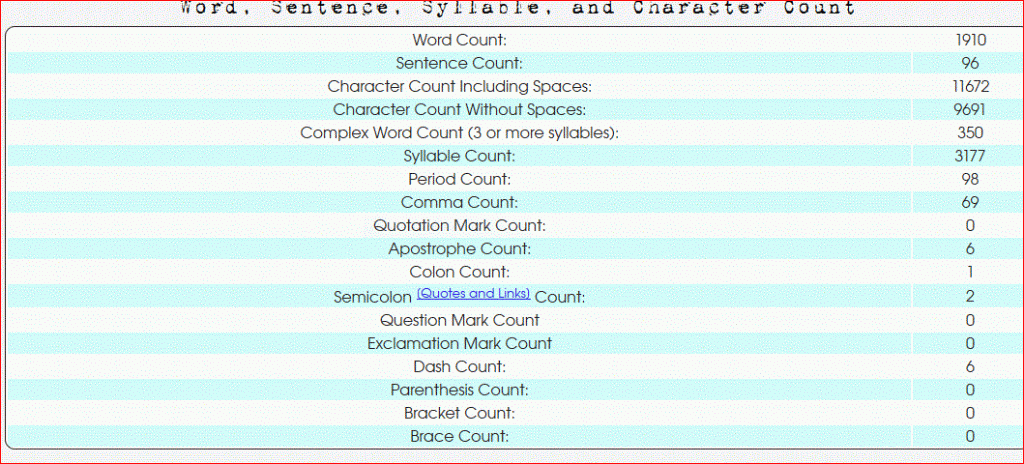
Word count of 2015 speech
However, with the excess of over 1,000 words in the 2019 speech, Buhari ignited several questions because he failed to answer them.
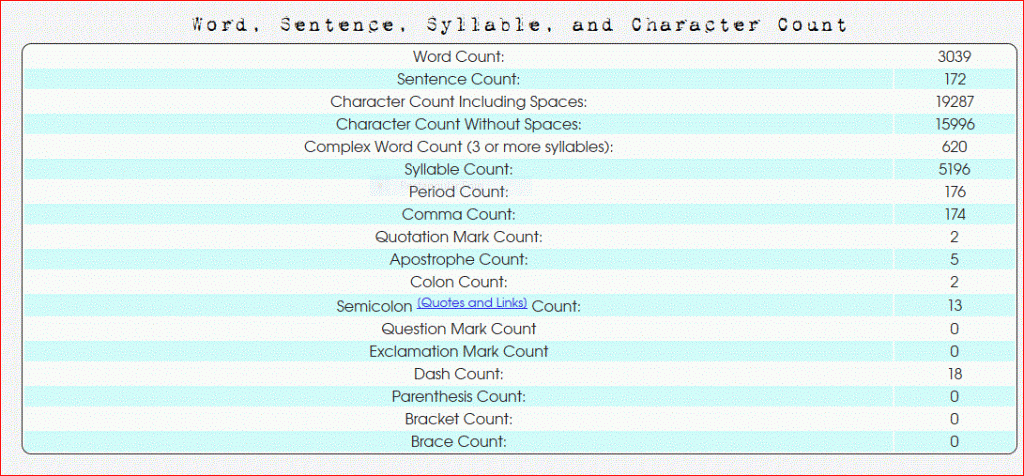
Word count of 2019 speech
Below are a few:-
1. What has happened to Boko Haram?
An analysis of the 2019 speech shows that the president mentioned Boko Haram only once, as against 10 times in his 2015 speech. So, what has happened to the sect? On June 12, 2019 while the high and mighty clinked cups of wine and ate sumptuous meals at the instance of Aso Rock Villa to mark Democracy Day, Boko Haram insurgents attacked a military base at Kareto village in Mobbar Local Government Area of Borno State. In the attack, the sect killed several Nigerians, among them a commanding officer of the Nigerian army. Nigerians who waited in suspense to hear the president’s fresh approach to stamp out the sect had their expectations cut off at the end of the 2019 speech. Incidentally, in 2015, there was the significant move of the ‘command centre’ on the counter-terrorism military campaign from Abuja to Maiduguri, a move that was hailed to high heavens by all and sundry. The 2019 statement does not contain a ‘next level’ indicator in the fight against the deadly sect.
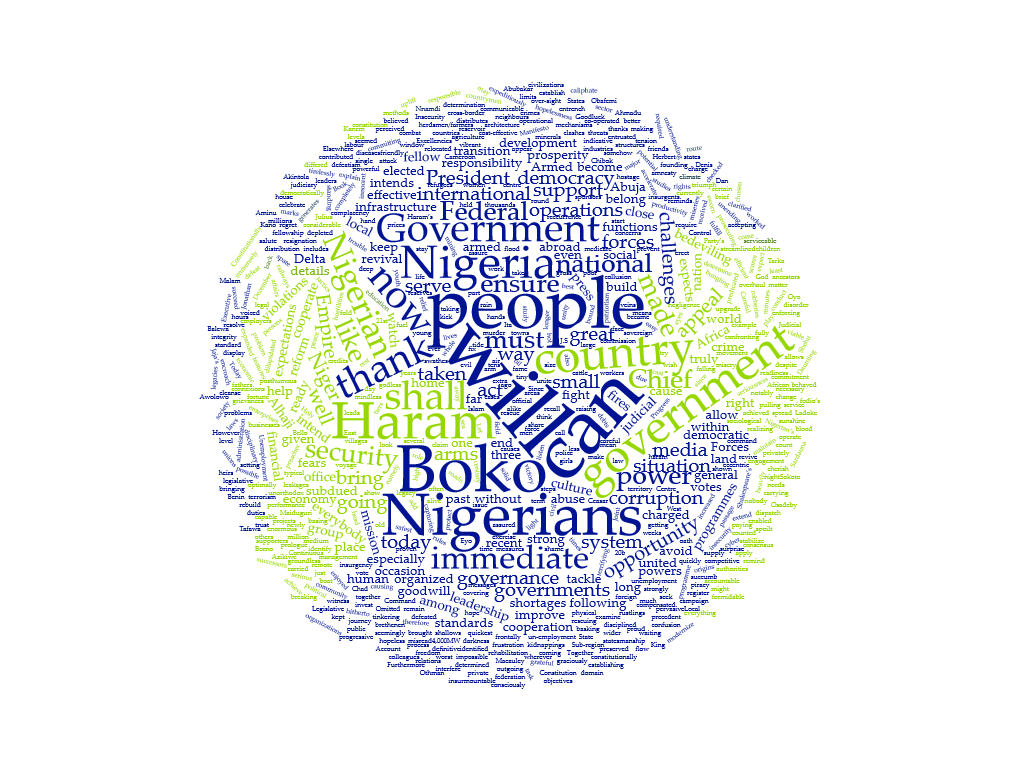
Word cloud showing Boko Haram as part of prominent words in 2015 speech
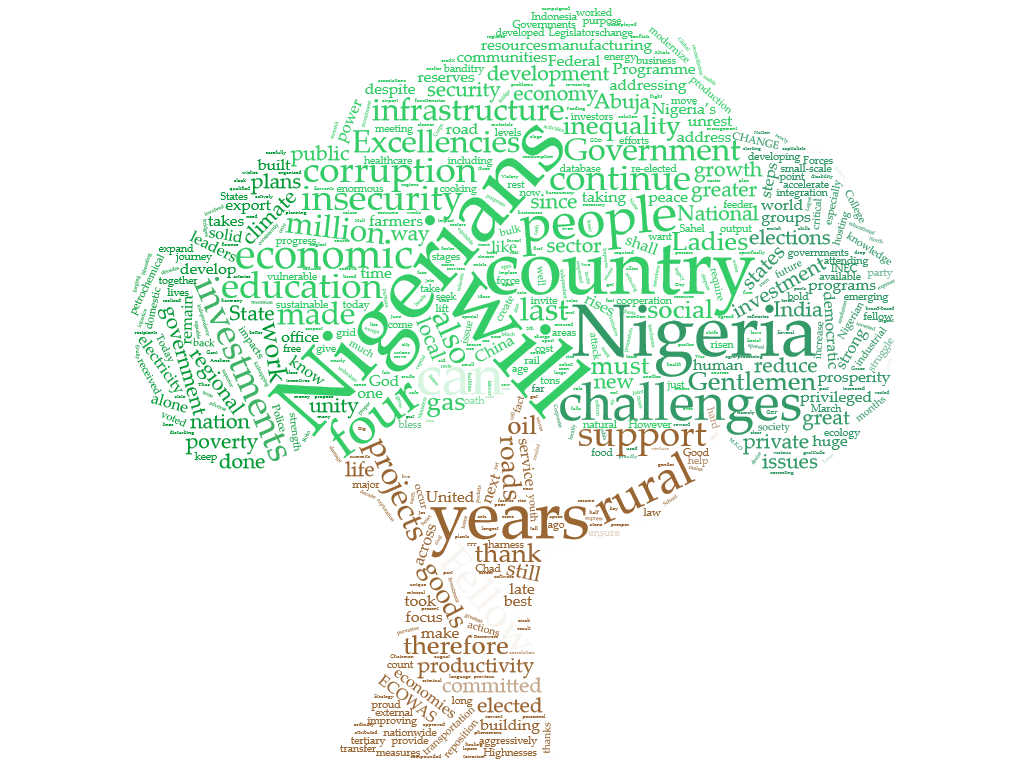
Word cloud showing that Boko Haram did not feature among prominent words in 2019 speech
2. ‘Terrorism is a global phenomenon…’ so what?
Perhaps, the most uninspiring section of the 74 paragraph speech is the content of paragraph 9. It says: “Terrorism and insecurity are worldwide phenomena and even the best policed countries are experiencing increasing incidents of unrest and are finding things hard to cope.” So, Nigerians should learn to live with terrorists? The killing of 25,794 Nigerians in the last four years under Buhari cannot be explained away in this manner. In spite of the fact that many nations are afflicted by new terrorism, the death toll is not so high across the globe because deliberate attempts are made to tackle terrorists. Instead of rolling out new measures, Buhari fell back and sought solace in this hackneyed line of thought that terrorism is not restricted to Nigeria.
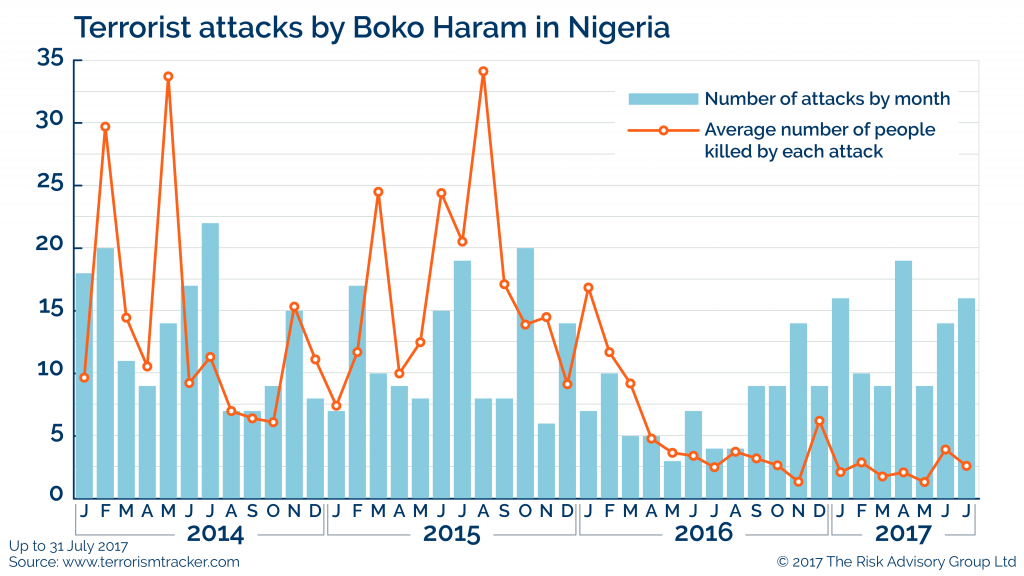
Chart showing terror attacks have not abated in Nigeria
3. ‘Ethnic, political or religious leaders’ incite killings to their benefit
This escapism in Buhari’s speech sends a wave of frustration down the spines of Nigerians. Frustration, because a government that has all instruments of power to make sure peace and security here descends to the domain of the handicapped. Why would government know ‘ethnic, political or religious leaders,’ who mastermind killings across Nigeria and decline to bring them to book? Billions of Naira is budgeted for security agencies whose cardinal responsibility, according to the National Security Act, is ‘to protect and defend the Federal Republic of Nigeria against domestic threats, to uphold and enforce the criminal laws of Nigeria, and to provide leadership and criminal justice services to both federal and state law-enforcement organs.’ With irrefutable evidence, not targets on political opponents, Nigerians would not condemn government if it captures and prosecutes any so-called leader who collaborates with criminals to convert Nigeria into a lake of blood.
4. ‘Can we quote Buhari on lifting 100 million Nigerians out of poverty …?’
Buhari’s 2015 inaugural speech has a quotable statement, though its originality is caged in controversy. He had said, ‘I belong to everybody and I belong to nobody.’ The version of the speech I use for this analysis has that statement as a stand alone sentence – a paragraph. Whether Buhari has demonstrated, in the last four years, the all-inclusiveness that such a populist statement demands could be a theme for a rancorous debate. Unfortunately, the 2019 speech lacked such a tall, grand, and sublime statement. What is close to an outstanding assertion was the president’s neither-here-nor-there statement that: “with leadership and a sense of purpose, we can lift 100 million Nigerians out of poverty in 10 years.” Who is to lead and who is to provide the ‘sense of purpose?’ Buhari has four more years as president, so why project what should happen over a period of 10 years?
But reading this line critically, there is no grain of commitment here. Economists cannot take the president’s supposition to the bank. With an annual population growth of about 3%, sluggish GDP growth of 2.5%, massive youth unemployment and staggering poverty, can this feat be achieved? Incidentally, Buhari’s conditional projection [which may be achieved in 2029] coincides with the Word Poverty Index’s prediction that by 2030 Nigeria would record extreme poverty put at about 45% of the population – a raw figure of 120 million Nigerians. The United Nations’ definition of extreme poverty is scary. It is explained to be “a condition characterized by severe deprivation of basic human needs, including food, safe drinking water, sanitation facilities, health, shelter, education and information. It depends not only on income but also on access to services.” Are Buhari’s policies focused on avoiding the foregoing? Doubtful. Economists have argued that even if the economy grows at 6% of GDP annually, it would take 100 years to drag the country out of poverty. It would take an aggressive stimulation of the economy, especially the manufacturing sector, to achieve a radical transformation of the economy. It is hoped that Buhari’s assertion that “this administration is laying the foundation and taking bold steps in transforming our country and liberating our people from the shackles of poverty,” is genuine and verifiable.
5. Like a rushed work
One disturbing perception from the president’s speech is that it looked like his craftsmen wrote it in between nerve-wracking schedule, in a hurry. While Nigerians expected a grand speech with projections into the future, Buhari’s speech was bereft of data and supporting evidence of his achievements. The administration prides itself for investments in small and medium scale enterprises, but the speech failed to tell Nigerians how many people benefitted, how much was invested, what the projected future investment is, who is going to be in charge, etc. There is hardly any bone to chew in the sumptuous array of achievements government claimed to have recorded.
But most embarrassing are obvious flaws, like, the speech saying Boko Haram controlled 18 local governments before Buhari took over. It has been proved that there were as many as 17 local governments under the sect’s control as at that time, not 18. Also, the speech said Buhari was voted for a second term in March 2019. The election happened in February. It said further that the president would take the Oath of Office on June 12, 2019, the day the speech was delivered. The fact is that he had taken the Oath of Office on May 29, 2019. One could guess that the speech may have been written for May 29, 2019, but Buhari did not deliver it when he took the Oath of Office, awaiting the upscale event on Democracy Day. Unfortunately, the speech was not revised before the president delivered it.
6. Promises for the record:
The president listed the following promises, but without timeline tags. So…? They are as follows:
a. We will see significant focus, resource and, where necessary reform, in tertiary and technical education to reposition Nigeria’s workforce for the modern technological age.
b. We will accelerate investments in primary, secondary and tertiary healthcare programs, interventions and infrastructure as well as in upgrading of our medical personnel to stem the flight of our best trained people.
c. On food security, our farmers have made great strides in local production of rice, maize, cassava, poultry, fertilizer, fisheries and sesame. We remain resolute in supporting private sector in emphasizing backward integration and export expansion plans.
d. Felling of trees to provide energy for domestic use is taking its toll on our rain forests, our ecology and our climate. Accordingly, we are taking steps to harness cleaner and more sustainable sources of electricity. We export over 2 million tons of cooking gas, yet we consume less than half a million tons.
e. We will work to address this issue and support rural communities with challenges of safely switching from firewood to cooking gas.
f. Dedicated agro-industrial processing zones will be developed on a PPP basis to increase farming yields, agricultural productivity and industrial output.
g. Over 2,000 kilometers of ongoing Federal road and bridge projects across the country will be completed to reduce journey times and the cost of doing business. As I mentioned earlier, critical feeder roads will be built to facilitate easier transportation for people and goods from rural areas to major roads.
h. We are at advanced stages of securing investments to modernize and expand our transmission and distribution infrastructure, ensuring that electricity is available and affordable for all Nigerians.
i. Several rail, seaport and airport projects are at various stages of completion. We will open the arteries of transportation nationwide.
j. It is a fact that Nigeria has more gas reserves than it has oil. Over the last four years, we have become a net exporter of urea, which is made from natural gas. We invite investors to develop more natural gas-based petrochemical projects.
k. Fellow Nigerians, This Government will not tolerate actions by any individual or groups of individuals who seek to attack our way of life or those who seek to corruptly enrich themselves at the expense of the rest of us. We will crack down on those who incite ordinary innocent people to violence and unrest.
l. We will ensure that such actions are met with the strong arm of the law.
Nation building takes time. But we must take solace in the knowledge that this country, our country, has everything we require to make Nigeria prosper.
An opinion poll could prove that many Nigerians can hardly remember the contents of Buhari’s 2019 speech, because its edges were to blunt to cut the wood.
The Insight Report
Nigeria Coverage

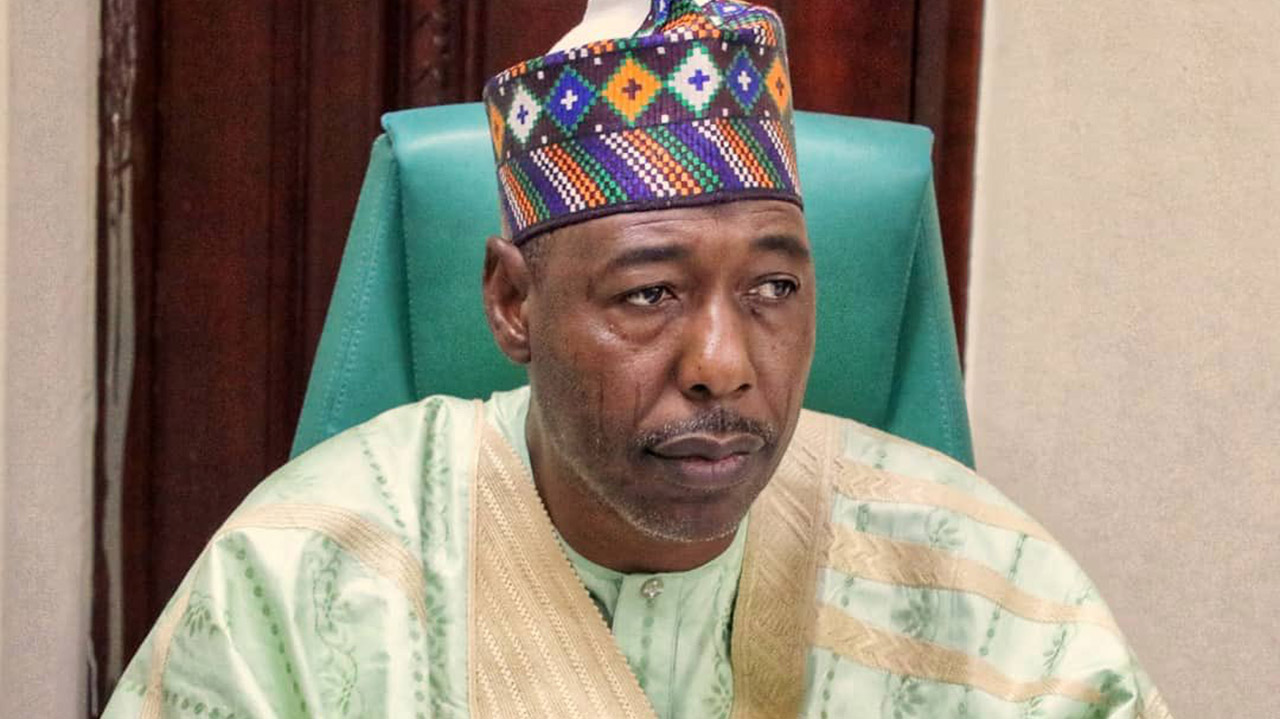

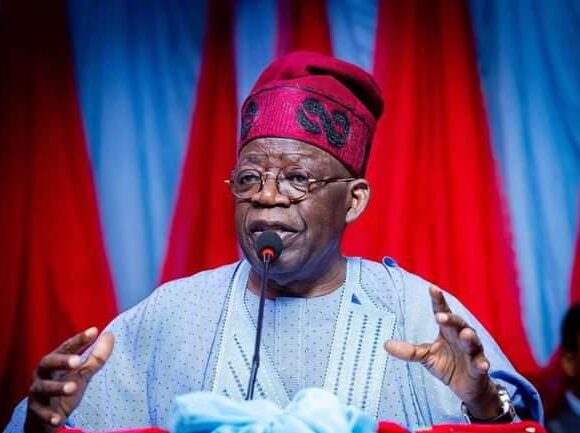
Mathias says:
Glad to see that you have now come to terms with the deception that has always been the hallmark of the man Muhammadu Buhari and his politics. I must observe, however, that your argument is a180 degrees about turn from what it was prior to the 2015 election. I am tempted to want to ask what has changed in you. You have now seen the light, I guess. An interesting article as a whole, but the observations are not really new or strange. You have basically restated what has been the obvious to many of us. Thanks for the link. I have subscribed.